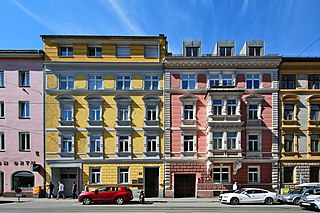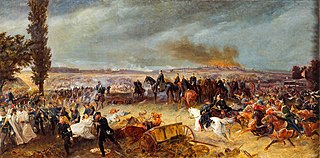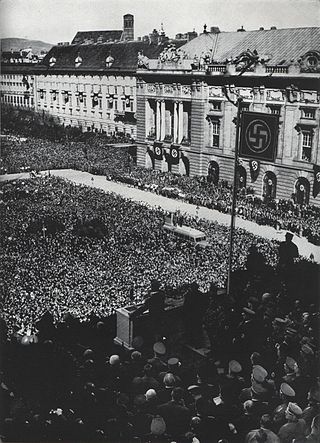Related Research Articles

Austria-Hungary, often referred to as the Austro-Hungarian Empire or the Dual Monarchy, was a constitutional monarchy and multinational state in Central Europe between 1867 and 1918. Austria-Hungary was a military and diplomatic alliance of two sovereign states, with a single monarch who was titled both Emperor of Austria and King of Hungary. Austria-Hungary constituted the last phase in the constitutional evolution of the Habsburg monarchy: it was formed with the Austro-Hungarian Compromise of 1867 in the aftermath of the Austro-Prussian War and was dissolved shortly after Hungary terminated the union with Austria on 31 October 1918.

The House of Habsburg, also known as the House of Austria, is one of the most prominent and important dynasties in European history.

Maria Theresa was ruler of the Habsburg dominions from 1740 until her death in 1780, and the only woman to hold the position suo jure. She was the sovereign of Austria, Hungary, Croatia, Bohemia, Transylvania, Mantua, Milan, Galicia and Lodomeria, the Austrian Netherlands, and Parma. By marriage, she was Duchess of Lorraine, Grand Duchess of Tuscany and Holy Roman Empress.

Graz is the capital city of the Austrian province Styria and second-largest city in Austria after Vienna. As of 1 January 2021, it had a population of 331,562. In 2018, the population of the Graz larger urban zone (LUZ) stood at 652,654, based on principal-residence status. Graz is known as a college and university city, with four colleges and four universities. Combined, the city is home to more than 60,000 students. Its historic centre (Altstadt) is one of the best-preserved city centres in Central Europe.

Franz Joseph I or Francis Joseph I was Emperor of Austria, King of Hungary, and the ruler of the other states of the Habsburg monarchy from 2 December 1848 until his death on 21 November 1916. In the early part of his reign, his realms and territories were referred to as the Austrian Empire, but were reconstituted as the dual monarchy of the Austro-Hungarian Empire in 1867. From 1 May 1850 to 24 August 1866, he was also president of the German Confederation.

Innsbruck is the capital of Tyrol and the fifth-largest city in Austria. On the River Inn, at its junction with the Wipp Valley, which provides access to the Brenner Pass 30 km (19 mi) to the south, it had a population of 132,493 in 2018.

Vienna is the capital, largest city, and one of nine provinces of Austria. Vienna is Austria's most populous city and its primate city, with about two million inhabitants, and its cultural, economic, and political center. It is the 6th-largest city proper by population in the European Union and the largest of all cities on the Danube river.

The Austro-Prussian War, also by many variant names such as Seven Weeks' War, German Civil War, Brothers War or Fraternal War, known in Germany as Deutscher Krieg, Deutscher Bruderkrieg and by a variety of other names, was fought in 1866 between the Austrian Empire and the Kingdom of Prussia, with each also being aided by various allies within the German Confederation. Prussia had also allied with the Kingdom of Italy, linking this conflict to the Third Independence War of Italian unification. The Austro-Prussian War was part of the wider rivalry between Austria and Prussia, and resulted in Prussian dominance over the German states.

Austrians are the citizens and nationals of Austria. The English term Austrians was applied to the population of Habsburg Austria from the 17th or 18th century. Subsequently, during the 19th century, it referred to the citizens of the Empire of Austria (1804–1867), and from 1867 until 1918 to the citizens of Cisleithania. In the closest sense, the term Austria originally referred to the historical March of Austria, corresponding roughly to the Vienna Basin in what is today Lower Austria.

The Austrian Empire, officially known as the Empire of Austria, was a multinational European great power from 1804 to 1867, created by proclamation out of the realms of the Habsburgs. During its existence, it was the third most populous monarchy in Europe after the Russian Empire and the United Kingdom. Along with Prussia, it was one of the two major powers of the German Confederation. Geographically, it was the third-largest empire in Europe after the Russian Empire and the First French Empire.

The Austria national football team represents Austria in men's international football competition and it is controlled by the Austrian Football Association.

Fußballklub Austria Wien AG (German pronunciation: [ˈaʊstri̯aː ˈviːn]; known in English as Austria Vienna, and usually shortened to Austria in German-speaking countries, is an Austrian professional association football club from the capital city of Vienna. It has won the most trophies of any Austrian club from the top flight, with 24 Austrian Bundesliga titles and 27 cup titles, although its rival SK Rapid Wien holds the record for most national championships with 32. Alongside Rapid, Austria is one of only two teams that have never been relegated from the Austrian top flight. With 27 victories in the Austrian Cup and six in the Austrian Supercup, Austria Wien is also the most successful club in each of those tournaments. The club reached the UEFA Cup Winners' Cup final in 1978, and the semi-finals of the European Cup the season after. The club plays at the Franz Horr Stadium, known as the Generali Arena since a 2010 naming rights deal with an Italian insurance company.

The Habsburg monarchy, also known as the Danubian monarchy, or Habsburg Empire, was the collection of empires, kingdoms, duchies, counties and other polities that were ruled by the House of Habsburg, especially the dynasty's Austrian branch.

The Red Bull Ring is a motorsport race track in Spielberg, Styria, Austria. The race circuit was founded as Österreichring and hosted the Austrian Grand Prix for 18 consecutive years, from 1970 to 1987. It was later shortened, rebuilt and renamed the A1-Ring, and it hosted the Austrian Grand Prix again from 1997 to 2003.

FC Red Bull Salzburg is an Austrian professional football club based in Wals-Siezenheim, that competes in the Austrian Bundesliga, the top flight of Austrian Football. Their home ground is the Red Bull Arena. Due to sponsorship restrictions, the club is known as FC Salzburg and wears a modified crest when playing in UEFA competitions.

World War I or the First World War, often abbreviated as WWI, was one of the deadliest global conflicts in history. It was fought between two coalitions, the Allies and the Central Powers. Fighting took place throughout Europe, the Middle East, Africa, the Pacific, and parts of Asia, especially East Asia. An estimated 9 million soldiers were killed in combat, plus another 23 million wounded, while 5 million civilians died as a result of military action, hunger, and disease. Millions more died as a result of genocide, while the 1918 Spanish flu pandemic was exacerbated by the movement of combatants during the war.

Archduke Franz Ferdinand Carl Ludwig Joseph Maria of Austria was the heir presumptive to the throne of Austria-Hungary. His assassination in Sarajevo was the most immediate cause of World War I.

The Anschluss, also known as the Anschluß Österreichs, was the annexation of the Federal State of Austria into the German Reich on 12 March 1938.

The Seven Years' War (1756–1763) was a global conflict that involved most of the European great powers, and was fought primarily in Europe, the Americas, and Asia-Pacific. Other concurrent conflicts include the French and Indian War (1754–1763), the Carnatic Wars (1744–1763) and the Anglo-Spanish War (1762–1763). The opposing alliances were led by Great Britain and France respectively, both seeking to establish global pre-eminence at the expense of the other. Along with Spain, France fought Britain both in Europe and overseas with land-based armies and naval forces, while Britain's ally Prussia sought territorial expansion in Europe and consolidation of its power. Long-standing colonial rivalries pitted Britain against France and Spain in North America and the West Indies. They fought on a grand scale with consequential results. Prussia sought greater influence in the German states, while Austria wanted to regain Silesia, captured by Prussia in the previous war, and to contain Prussian influence.

Austria, formally the Republic of Austria, is a landlocked country in Central Europe, lying in the Eastern Alps. It is a federation of nine provinces, one of which is the capital, Vienna, the most populous city and province. Austria is bordered by Germany to the northwest, the Czech Republic to the north, Slovakia to the northeast, Hungary to the east, Slovenia and Italy to the south, and Switzerland and Liechtenstein to the west. The country occupies an area of 83,871 km2 (32,383 sq mi) and has a population of 9 million.
References
- ↑ "Team Stats". Austria Soccer. Retrieved 28 April 2012.